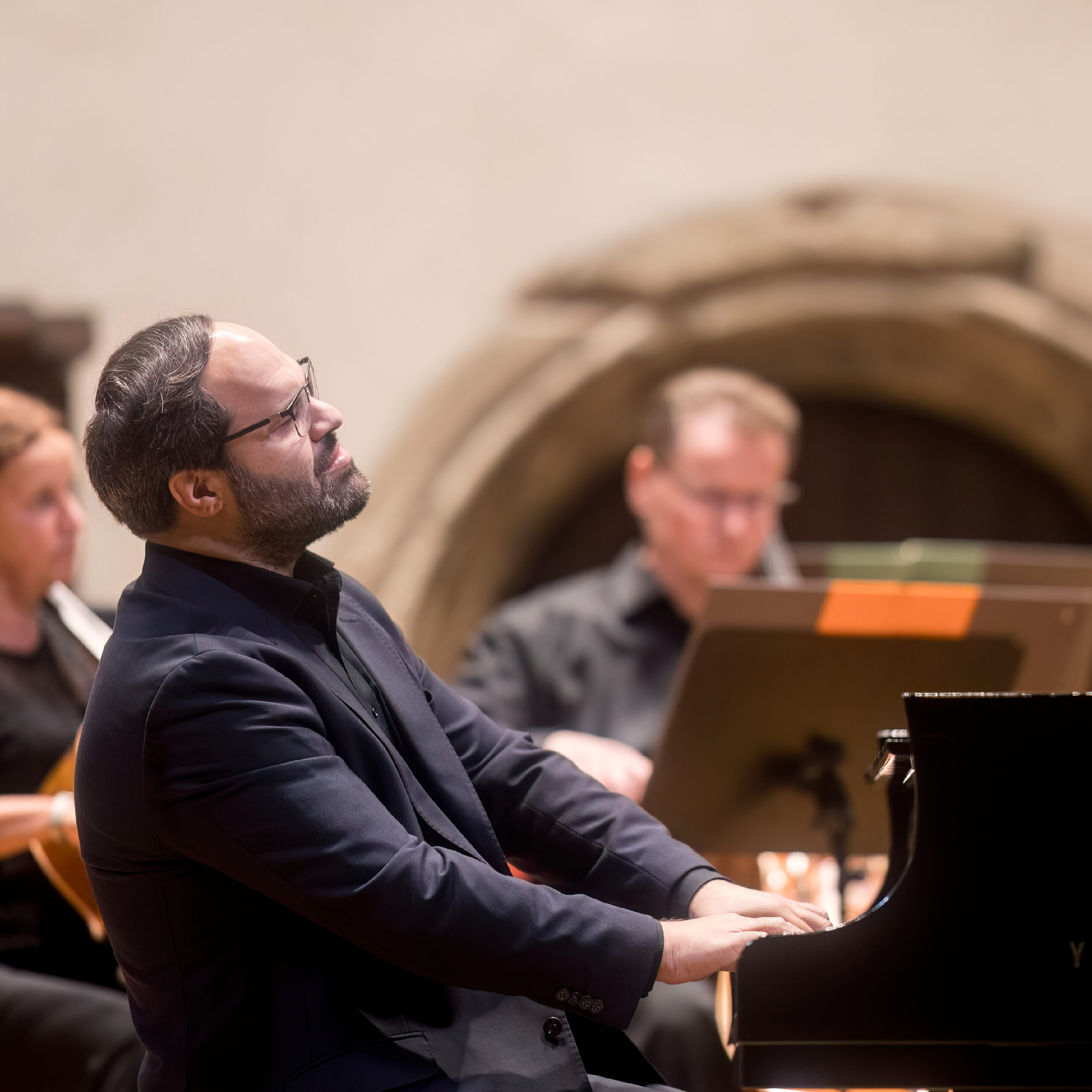
Časopis Harmonie reviews Jan Bartoš’ concert with Prague Radio Symphony Orchestra
Jan Bartoš shone at the Bethlehem Chapel with Antonín Rejcha's Piano Concerto in E-flat major.
The Czech Radio Symphony Orchestra prepared a nicely conceived program for the first evening of its concert series at the Bethlehem Chapel (September 19, 2024). The concert featured works by three composers who were very close both personally and artistically: Ludwig van Beethoven, Antonín Rejcha, and Joseph Haydn. Vojtěch Spurný, one of our most distinguished interpreters of early music, took up the baton.
Beethoven's only opera, Fidelio, was originally titled Leonora, and the composer created three (or four) completely different overtures for it. Today, the Leonora overtures are performed separately and are also separately numbered. The Leonora I overture, op. 183, performed by the SOČR at the start of their concert, was actually the second to be composed chronologically. Under Vojtěch Spurný's direction, the piece had a solid form and the tempo changes were convincingly executed by both the conductor and the orchestra. The slow introduction was admirably driven and tense, and the overall mood of the fast sections was distinctly optimistic, with the interpreters lending an almost Rossinian lightness to the music at the end.
The highlight of the evening was Antonín Rejcha's Piano Concerto in E-flat major featuring soloist Jan Bartoš. Rejcha is one of the most remarkable figures in the history of European music, but his works are rarely encountered on concert stages today. His Piano Concerto is seldom heard. The thematic material of the first movement is quite distinctive and the composer worked with it very inventively. The solo part was equipped with everything the audience expects from a virtuosic piano concerto and that every pianist likes to show off: fast scalar runs, spread and broken chords, and various effective finger tricks. From his first solo entry, Jan Bartoš played Rejcha with a beautiful, firm, resonant tone, brilliantly, with élan, and very inspiredly. It was a joy to listen to him. While Bartoš's piano sounded truly beautiful in the Bethlehem Chapel, the orchestra, surprisingly, seemed to "lose" its sound a bit. I'm not sure how much this was due to the acoustics, the composition itself, or how much the conductor was simply trying not to overshadow the soloist. The Adagio second movement is somewhat peculiar, as if dissolving before the listener. It surprises with interesting harmonies and a wealth of long trills, but we hear few more pronounced continuous melodies. Jan Bartoš presented this peculiar movement so freely and relaxed that at many points his performance seemed like improvisation. The sound of the orchestra here, too, occasionally "lost" itself similarly to in the first movement. The conceptually uncomplicated final rondo with a playful main theme and a number of nice ideas had the necessary verve, and Jan Bartoš again shone with his nimble fingers and sparkling approach. In this movement, the orchestra found a sound balance with the piano and added the necessary lustre to the music. Rejcha's Piano Concerto in E-flat major is certainly worth attention, and in the performance of the SOČR, Jan Bartoš, and Vojtěch Spurný, it sounded with such quality that it would deserve a CD release.
Haydn's Symphony No. 98 in B-flat major, Hob. I:98, is among the lesser-performed of the famous composer's twelve so-called London symphonies. The first movement is characterised by witty and cleverly processed ideas, and Vojtěch Spurný evidently realised every detail. He let the second movement flow freely without needing to make it particularly special. The orchestra played the minuet with visible delight and enlivened it with fun sound effects, while the trio in the SOČR's rendition had a delightful rustic touch. The symphony is crowned by a final presto – humorous and full of original surprises. The orchestra played it lightly and airily, clearly enjoying themselves. Just before the end of this movement, Vojtěch Spurný left the conductor's podium and moved to the piano to play nearly twelve "solo" measures that Haydn had prescribed in the score as a quirky joke. And Vojtěch Spurný showed that he is truly a master of his craft: the grand piano (which remained on stage from Rejcha) sounded like a harpsichord after those twelve measures.
Despite a few details in the orchestra that might not have passed muster in a recording, it was a very enjoyable and entertaining evening. And such evenings are never enough.
by Věroslav Němec on Časopis Harmonie
